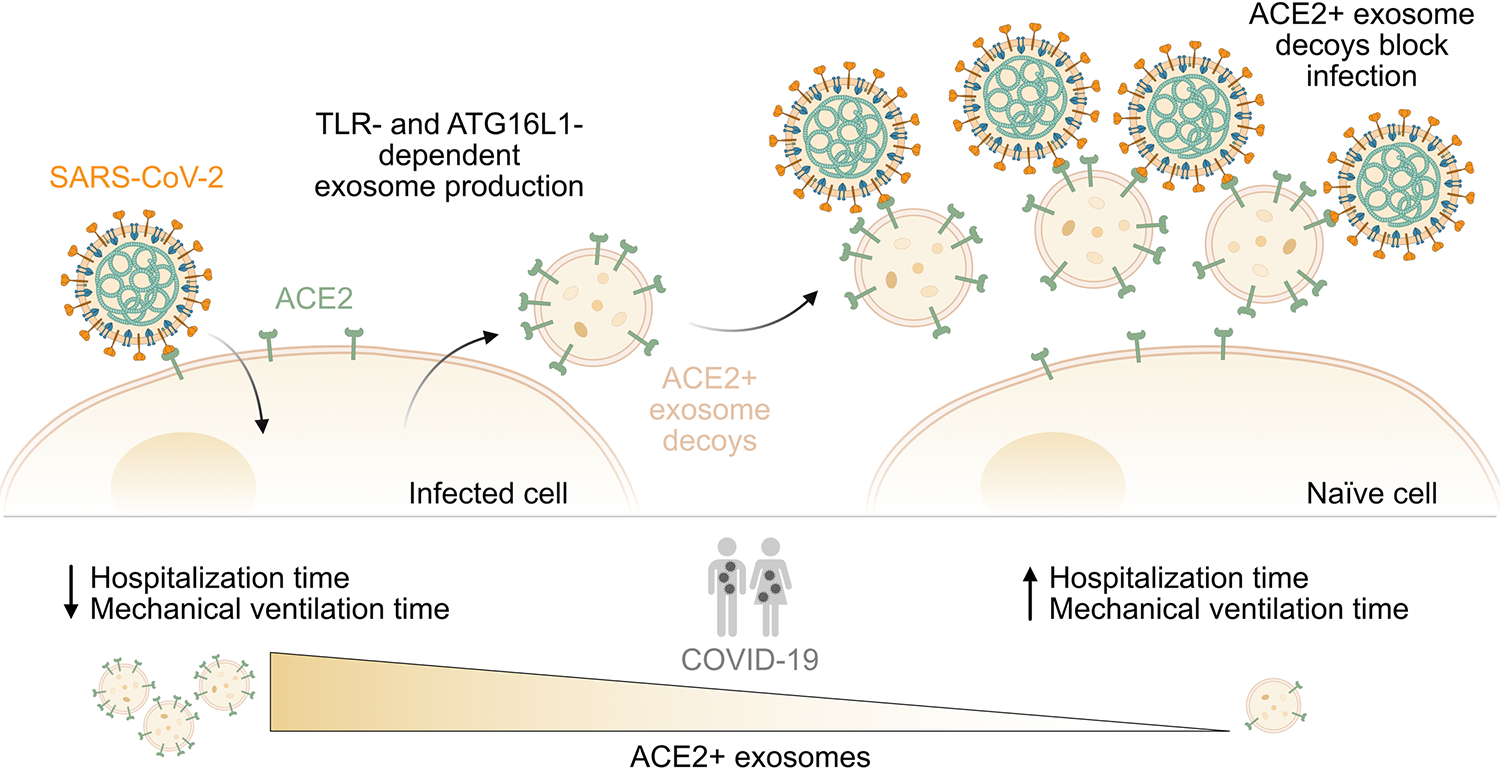SARS-CoV-2 has been intensively studied since the start of the coronavirus disease 2019 (COVID-19) pandemic. Determining host factors involved in viral replication and evaluating the immune responses have been pivotal in exploring pathogenesis, COVID-19 susceptibility, and therapeutics. Initial studies identified human cell surface angiotensin-converting enzyme 2 (ACE2) as the host receptor for SARS-CoV-2.
Multiple reports suggest novel strategies for using ACE2 receptors as decoys in soluble or nanoparticle (NP)-displayed form to sequester SARS-CoV-2 virions away from authentic ACE2 expressed on cells and prevent infection. Several preclinical studies have demonstrated the success of this approach, which could form a broad therapeutic option for mutant SARS-CoV-2 variants, which commonly use the ACE2 receptor.
In a study, researchers at the University of Zurich, Switzerland, identified a subset of exosomes, termed defensosomes, secreted specifically during bacterial infection. These defensosomes incorporated surface receptors to the levels typically expressed on cells and were decoys for bacterial toxins, which otherwise would have mediated toxicity through interactions with receptors on living cells.
ACE2-coated exosomes in COVID-19 patients
Building on this evidence, researchers of that study reasoned that such defensosomes might also form in response to viral infections. If sufficient levels of ACE2 were displayed, the defensosomes could act as decoys for SARS-CoV-2. To this end, they tested bronchioalveolar lavage fluid (BALF) samples collected from COVID-19 patients with critical illness under intensive care and mechanical ventilation.
Exosomes were enriched in the (BALF) samples using flow cytometry and biochemical fractionation. ACE2-expressing exosomes were observed, and intriguingly, the proportion of ACE2-decorated exosomes and ACE2 levels per exosome markedly varied between individuals. Correlation analyses revealed that for patients with high ACE2-expressing exosomes, the length of hospital stay was shorter with less time on ventilation than those with low levels of ACE2-coated exosomes, suggesting a protective role of defensosomes.
SARS-CoV-2 infection triggers the secretion of ACE2-coated defensosomes
Next, they showed that SARS-CoV-2 could trigger the secretion of ACE2-coated exosomes in cell-based assays in vitro. This induction was comparable to bacterial induction in that both required autophagy components of the host and was recapitulated by some immune stimuli. Nevertheless, activation of pattern-recognition receptors (PRRs) in response to SARS-CoV-2 did not increase exosomal secretion, suggesting a specific mechanism linking TLRs, defensosomes, and autophagy components.
Furthermore, the researchers isolated ACE2-positive and -negative exosomes and incubated them with SARS-CoV-2 before inoculating permissive cells. Only ACE2-expressing exosomes prevented viral infection. Tomography and cryo-electron microscopy analyses illustrated the capture and clustering of viral particles on the surface through a direct interaction between viral spike and ACE2.
 ACE2-positive exosomes are endogenous decoys that limit SARS-CoV-2 infection and COVID-19 severity. Infection with SARS-CoV-2 triggers the production and release of exosomes that express the SARS-CoV-2 receptor ACE2 on their surface. This process is likely dependent on TLR signaling pathways and the autophagy component ATG16L1. ACE2-positive exosomes act as decoys by binding SARS-CoV-2, thereby preventing viral particles from interacting with ACE2 expressed on the surface of naïve host cells. In BALFs from critically ill COVID-19 patients, the abundance of such ACE2-positive exosomes, as well as the amount of ACE2 expressed on each exosome, varied considerably between individuals. Patients with higher levels of ACE2-positive exosomes were hospitalized for shorter times and required fewer days of mechanical ventilation than patients with lower levels of ACE2-positive exosomes. This suggests that endogenous ACE2-positive exosomes can have a protective decoy role against SARS-CoV-2 in humans. ACE2, angiotensin-converting enzyme 2; ATG16L1, Autophagy Related 16 Like 1; BALF, bronchioalveolar lavage fluid; COVID-19, Coronavirus Disease 2019; SARS-CoV-2, Severe Acute Respiratory Syndrome Coronavirus 2; TLR, Toll-like receptor.
ACE2-positive exosomes are endogenous decoys that limit SARS-CoV-2 infection and COVID-19 severity. Infection with SARS-CoV-2 triggers the production and release of exosomes that express the SARS-CoV-2 receptor ACE2 on their surface. This process is likely dependent on TLR signaling pathways and the autophagy component ATG16L1. ACE2-positive exosomes act as decoys by binding SARS-CoV-2, thereby preventing viral particles from interacting with ACE2 expressed on the surface of naïve host cells. In BALFs from critically ill COVID-19 patients, the abundance of such ACE2-positive exosomes, as well as the amount of ACE2 expressed on each exosome, varied considerably between individuals. Patients with higher levels of ACE2-positive exosomes were hospitalized for shorter times and required fewer days of mechanical ventilation than patients with lower levels of ACE2-positive exosomes. This suggests that endogenous ACE2-positive exosomes can have a protective decoy role against SARS-CoV-2 in humans. ACE2, angiotensin-converting enzyme 2; ATG16L1, Autophagy Related 16 Like 1; BALF, bronchioalveolar lavage fluid; COVID-19, Coronavirus Disease 2019; SARS-CoV-2, Severe Acute Respiratory Syndrome Coronavirus 2; TLR, Toll-like receptor.
Concluding remarks
In summary, the findings suggest novel antiviral activity of endogenously-induced ACE2-decorated defensosomes against SARS-CoV-2, thus encouraging the development of ACE2-based therapies for COVID-19.
Notably, the inter-individual variability in secreting protective ACE2 defensosomes suggests that the inability to mount an adequate defensosome response might contribute to COVID-19 severity. However, further studies are required to understand the content of specific defensosomes and determine which host receptors are expressed and whether this is a random or selective mechanism.